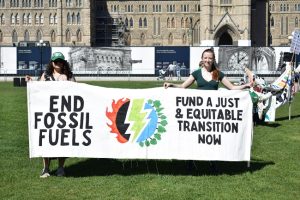Governments have reportedly listened to growing calls for the UN Summit of the Future to address the threat of coal, oil and gas by explicitly adding that Heads of States “decide to (…) transition away from fossil fuels” in the latest draft outcome, made public on Thursday, August 29, 2024.

The third revision of the Pact for the Future, the outcome of the upcoming landmark summit in September, brings in strengthened text explicitly addressing fossil fuels. The critical revision comes after a bloc of nation-states, hundreds of civil society organisations, 77 world leaders and Nobel laureates, and over 45,000 individuals united to express their grave concerns that earlier drafts of the Pact did not even mention “fossil fuels”, despite the significant risk they pose to our future.
Jody Williams, International Campaign to Ban Landmines, Nobel Peace Prize 1997, said: “We welcome governments committing to transitioning away from fossil fuels in the Pact for the Future, and call on them to match these words with action, starting with ending the expansion of new oil, gas and coal projects. When faced with other global threats like landmines, nuclear weapons or an ozone in crisis, nations have come together – not just with declarations, but with binding treaties and multilateral frameworks. We must now join forces once again to address one of the greatest threats of our time: the extraction and burning of fossil fuels.”
After decades of efforts from civil society, scientists, and the world’s most vulnerable nations, fossil fuels finally took centre stage in the UN COP28 climate talks in Dubai in 2023 and have now been pushed back onto the agenda for the UN Summit for the Future.
However, like the COP28 outcome, the latest draft text – which is not yet final – includes several qualifiers and loopholes designed to allow fossil fuel producers to expand their coal, oil and gas extraction. This is a critical step, but far from a final victory. While outcome declarations are important and can send a powerful signal, governments must ensure they are strong, actionable, and produce meaningful results for people and the planet.
Alex Rafalowicz, Executive-Director of the Fossil Fuel Non-Proliferation Treaty Initiative, said: “This new draft of the Pact cements the commitment from COP28. It includes a decision by governments to transition away from fossil fuels – proof that the voice and vision of people everywhere are being heard. If the language stays, it’s clear there’s no going back. This is a first step, but declarations alone will not suffice. We need to build on this outcome with immediate, decisive action and concrete plans to turn these commitments into reality.
“It’s clear that to deliver this vision we need to mobilise resources today. A Fossil Fuel Non-Proliferation Treaty is a next step in this journey – a binding global plan to manage an equitable decline in fossil fuel production, ensuring wealthy nations move first and fastest, while providing the necessary resources to secure a just transition for all.”
The full excerpt with the mention of fossil fuels states:
“Action 9. We will strengthen our actions to address climate change. (…) We decide to: (…) (e) Accelerate the development, transfer and deployment of clean and renewable energy technologies, including to triple renewable energy capacity globally, and double the global average annual rate of energy efficiency improvements by 2030, as well as accelerate the development and deployment of other zero and low-emission technologies and transition away from fossil fuels in energy systems in a just, orderly and equitable manner, so as to achieve net zero by 2050 in keeping with the science.”
The letter to governments negotiating the Pact for the Future from former world leaders and Nobel laureates was delivered on August 13, just over two weeks before the latest revisions sought to address their concerns. This effort was coordinated by the Fossil Fuel Non-Proliferation Treaty Initiative, a global campaign aiming to foster greater international cooperation on the just transition away from coal, oil and gas extraction. The original letter and list of signatories is available here.
